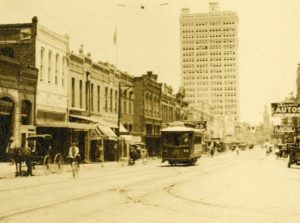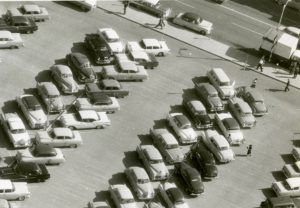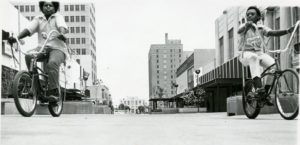Bicycle commuting makes sense in Waco
By Eric Martin
Most people don’t enjoy their drives to work. In surveys, Texans rank commuting dead last in our preferences among daily activities. That’s not surprising: driving is frustrating and remarkably bad for our health, causing sleep loss, backaches, and higher blood pressure. It’s also bad for our social and personal lives: long commutes have been associated with loneliness and higher divorce rates [1].
Although we dislike long commutes, and we know they’re bad for our health, our commutes keep on growing, and the average American now spends 52 minutes a day just getting to and from work. That’s an astonishing waste of time and potential. More time in cars means less time invested in family, friends, or pursuits that matter to us.
Thankfully, most Wacoans don’t need to endure such long commutes, but we’ve followed the same trends as the rest of the country, living farther from places of work and so spending more of our time in cars.
We sacrifice that quality time because we think its loss will be made up for by other benefits. Sometimes, it’s a larger house in the suburbs. At other times, it’s the larger paycheck from a new job farther from home. But it turns out that those advantages do not outweigh the downsides of spending our lives in cars: on the whole, people report they are less happy when they accept longer commutes.
This trade-off of is so well known that researchers even have a name for it: “the commuting paradox” [2]. It seems paradoxical because we willingly make a trade-off that decreases our own wellbeing. We overestimate the benefits of bigger houses and paychecks, and underestimate the downsides of long commutes and loss of community.
Higher income and larger houses do make us happy, but only for a while. We quickly adapt to them, and then they stop conferring much happiness. Curiously, we don’t adapt to social isolation. It turns out, we are often wrong about what will make us happy.

Photo courtesy of the Texas Collection, Baylor University
Driving wasn’t always our preferred option for getting around town. In the past, Wacoans commuted by other methods: we walked, biked, and took streetcars to get around town. In central Texas, the Interurban Railway got Wacoans through town and connected us with McKinney, Denison, and Dallas. An incredible 819,000 passengers used this system at its peak in 1920 [3].
Single-passenger vehicle driving only became our dominant mode of transportation when Texans left cities for the suburbs in the 1950s, 60s, and 70s. The history of our car driving is strongly connected with the history of our flight from cities. (I have previously written about the destructive effects of “white flight” in Waco here.)

Photo courtesy of the Texas Collection, Baylor University
But there is an attractive alternative to such trends – an alternative which might encourage us to think about living in closer proximity to our places of work, school, and shopping: the trusty bicycle!
Bicycle commuting just makes sense in Waco. We already benefit from wide roads with plenty of space for multiple user groups, and we also enjoy good weather for most of the year. Additionally, the city plans to invest in more bike lanes that will help connect residential areas with employment and economic centers.
For me, getting to and from work isn’t the worst part of my day; it’s often one of the best parts. Here are a few of the tangible ways that cycling around Waco improves my own quality of life:
+ Cycling gets me places faster. This may seem counter-intuitive, but given that about half of all our car trips are within 3 miles of home, you’d be surprised how fast the journey can be on a bike. When I subtract the time I would have spent parking, most of these shorter trips are actually faster on a bike than in a car.
+ Cycling saves me money. Between gas, oil changes, and repair, driving a car is expensive. City driving is especially hard on cars and requires regular maintenance. Bicycles are cheap by comparison, costing less than public transit and far less than cars.
+ Cycling is free exercise. I feel more energetic and healthy when I get even a few minutes of physical activity every day. No need for that pricey gym membership when you’re getting around town by bike.
+ Cycling supports our local economy. I’m happy when my money stays in Waco rather than going to corporate offices in some faraway city. Local economies flourish when more people are walking and cycling compared with driving [4].
+ Cycling doesn’t pollute the air. About 600,000 children in Texas have asthma, and over 500 of them are hospitalized each year on account of it [4]. We know that pollutants from our cars cause asthma and other respiratory diseases. If Wacoans want to “love one another,” then we must ask how our own behavior affects our neighbors’ wellbeing.
+ Cycling is simply an elegant way to travel. I’m dependent only on a simple machine, and I feel free while using it. Cycling connects me with parts of my environment that I’m otherwise isolated from: the city’s topography, the weather, and the people in my community.
What about safety? Isn’t cycling dangerous? It’s true that being on the roads with cars takes some practice and caution. And our city can help make cycling safer with better infrastructure such as bike lanes. But that said, cycling may not be as dangerous as you think. Recall that the exercise from cycling imparts substantial health benefits and decreases risk from the leading causes of death.

Photo courtesy of the Texas Collection, Baylor University
While automobiles clearly have their uses, by and large, they haven’t made Americans happier, and they often make us less happy. That could prompt you to try something new. More and more Americans are commuting by bicycle. You might be surprised to rediscover how fun it can be.
 Eric Martin is an Assistant Professor of History & Philosophy of Science at Baylor University’s Great Texts Program. When he’s not at work, he can be found riding his bicycle, exploring Cameron Park, or enjoying coffee.
Eric Martin is an Assistant Professor of History & Philosophy of Science at Baylor University’s Great Texts Program. When he’s not at work, he can be found riding his bicycle, exploring Cameron Park, or enjoying coffee.
The Act Locally Waco blog publishes posts with a connection to these aspirations for Waco. If you are interested in writing for the Act Locally Waco Blog, please email [email protected] for more information.
Notes:
[1] See Daniel Kahneman and Alan B. Krueger. 2006. “Developments in the Measurement of Subjective Well-Being” Journal of Economic Perspectives 20:1 3–24; Robert D. Putnam. 2000. Bowling Alone: the Collapse and Revival of American Community. New York: Simon & Schuster; Erica Sandow. 2014. “Til Work Do Us Part: The Social Fallacy of Long-distance Commuting” Urban Studies 51:3 526-543.
[2] Alois Stutzer and Bruno S. Frey. 2004. “Stress That Doesn’t Pay: The Commuting Paradox” IEW – Working Papers 151, Institute for Empirical Research in Economics, University of Zurich.
[3] Terri Jo Ryan, “Interurban Railway,” Waco History, accessed November 26, 2016, http://wacohistory.org/items/show/117.
[4] Tanya Snyder, “Bicycling Means Business: How Cycling Enriches People and Cities,” StreetsBlog USA, accessed November 26, 2016, http://usa.streetsblog.org/2013/03/08/bicycling-means-business-how-cycling-enriches-people-and-cities/
[5] http://www.cdc.gov/asthma/stateprofiles/asthma_in_tx.pdf
